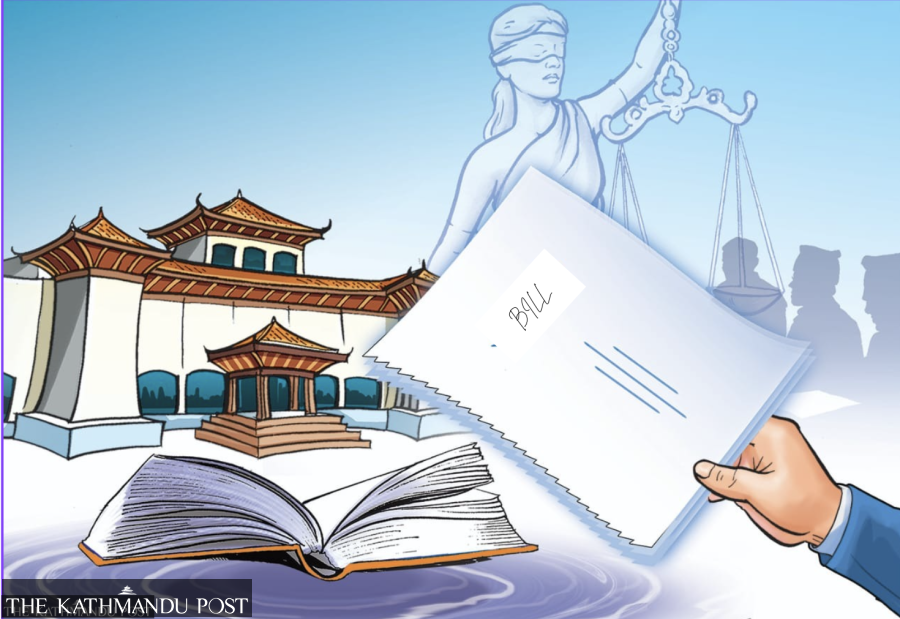Politics
Government withdraws bill that’d give amnesty to political-criminal convicts
The Dahal-led government last year forwarded the bill to amend Section 116 of the Criminal Procedure Code-2017.
Post Report
The government has withdrawn a controversial provision from the ‘Bill to amend some Nepal Acts’ that envisioned allowing the withdrawal of criminal cases committed under political cover.
The Pushpa Kamal Dahal-led government on May 10 last year had registered the bill at the Parliament Secretariat to amend Section 116 of the Criminal Procedure Code-2017 so as to clear the hurdles to withdrawing insurgency-era cases of “political nature”.
Section 64 of the amendment bill has a provision that says cases sub judice in any court against anyone from a party or a group that conducted violent protests in the past but is carrying out its activities peacefully now, based on the constitution and the law can be withdrawn.
In the bill, the government has added a sub-section under section 116 of the code, which ultimately aims at withdrawing the cases from all tiers of courts—Supreme, High and District—against political leaders.
Participating in the discussion over the bill in the Law, Justice and Human Rights Committee of the House of Representatives on Sunday, Law Minister Ajay Kumar Chaurasiya said that Section 64 of the bill had been drawn.
“It has to be withdrawn as it might lead to impunity,” said the minister, adding that the decision was made with consent from Dhanraj Gurung, who in the capacity of law minister had registered the bill.
Prior to Chaurasiya, Uday Raj Sapkota, secretary at the ministry, had revealed that the government had decided to withdraw the provision.
The government holds the authority to produce the bill. It can also withdraw any bill or a part with consent from Parliament. Though a majority of lawmakers welcomed the government’s move, those from the CPN (Maoist Centre) objected to it. Claiming that the provision was introduced to implement past agreements with political forces such as those led by CK Raut and Netra Bikram Chand.
Maoist lawmakers have threatened to register notes of dissent if the provision is withdrawn. “The government, in the past, signed deals with different political forces agreeing to withdraw the charges against them. It is the government's responsibility to abide by the agreements,” said Ram Kumar Rai, a Maoist Centre lawmaker.
“In fact, then-prime minister KP Sharma Oli, who also leads the government now, had forged the agreement. Instead of implementing it, the government is withdrawing the provision.”
The preparations by the Dahal government to amend the Criminal Procedure Code had landed into controversy for suspicions that it was aimed at withdrawing the insurgency-era cases of atrocities.
Even the National Human Rights Commission, organising a press meet, had objected to the move saying it was deeply concerned about the amendment bill. It argued there was a high possibility that the amendment would lead to the withdrawal of conflict-era charges of human rights violations by giving them political colour.
The commission also sought the government’s clarification on the matter though the Dahal administration didn’t respond to it.
The Truth and Reconciliation Commission has received 63,718 complaints. Separately, 3,223 cases were lodged with the Enforced Disappearances Enquiry, Truth and Reconciliation Commission. However, the disappearance commission is investigating only 2,484 cases saying that others do not fall under its jurisdiction.
There are also several cases under consideration in various courts against Maoist Centre leaders and security personnel in connection with the crimes committed during the decade-long insurgency. If the bill got through Parliament, it would give a legitimate way for the government to arbitrarily withdraw the cases.
After months-long gap, the House committee has resumed deliberation over the bill that has been under consideration for one-and-a-half years. As the government prepares to call the winter session of federal parliament in January, the Speaker, along with the government, wants the House committees to forward the bills, with them, to the plenary.
Sixteen bills are under consideration in various parliamentary committees, also called mini parliaments.




 10.12°C Kathmandu
10.12°C Kathmandu














